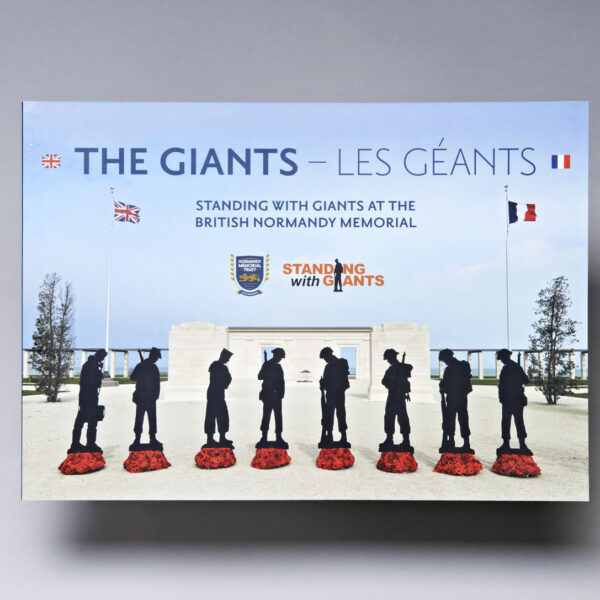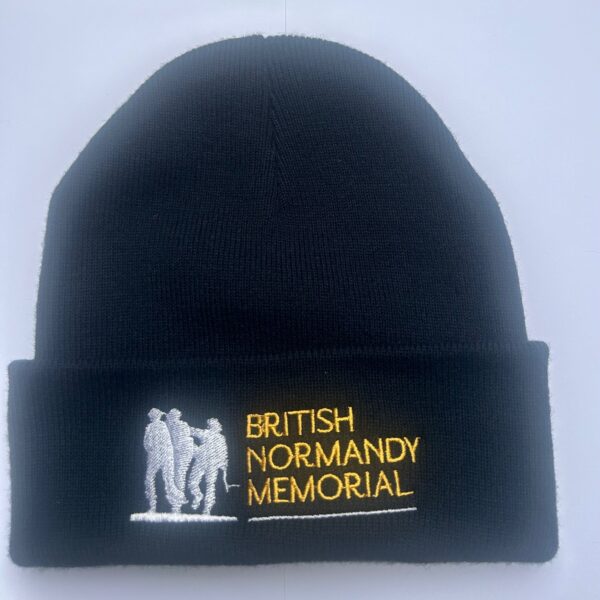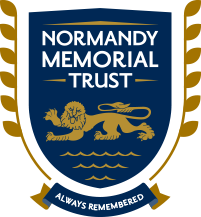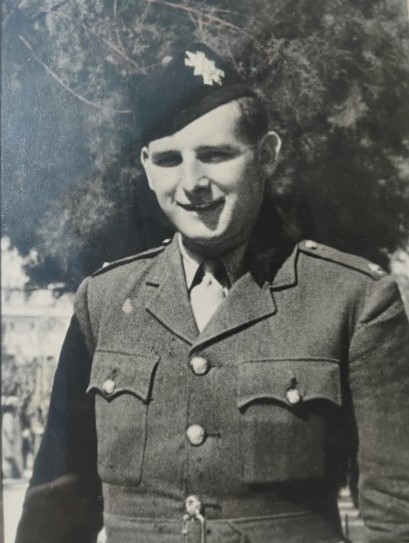
James Campbell Rennie
This story and photos were compiled and shared with the Trust by kind permission from relatives of James Campbell Rennie. The story is drawn from a book 'Memoirs and Memories of a brother' by Archibald L. Rennie, assisted by Ian C. Rennie (who prepared this extract), two of James's brothers'
James was born at Guard Bridge, just outside St Andrews, Fife, on the 28th August 1922, the first of John and Isabella Rennie’s six children, four sons and two daughters, but he never met his youngest sister who was born two months after he was killed in action. John Rennie was a railway signalman at Leuchars Junction and, after a second son was born in 1924, the family moved to Leuchars where John had a house built on a site he bought on the outskirts of the village.
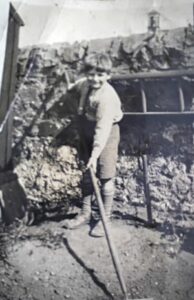
James in the garden of the family home at Hill Pleasant, Leuchars in July 1929
James was educated first at Leuchars School then at Madras College, St Andrews, where he took an active part in school life, particularly the Literary and Debating Society. He was also a keen rugby player and was hooker in the First XV in his final year. He also played a prominent part in village life in Leuchars where he was a long-time member of the Boys’ Brigade, was a founder member of the Leuchars Young People’s Club and, for a time, secretary of Leuchars Athletic Football Club, often turning out for the Club on Saturday afternoon after playing rugby for the school in the morning.
As a teenager James worked for the local baker and on local farms at harvest time, investing some of his earnings on an old motor bike which he kept at a local farm. Unlicensed and uninsured, he and a friend used it only for off-road riding. James remained at school for only a short period in his sixth year, leaving soon after his 17th birthday to start a banking career as an apprentice in the St Andrews branch of the Commercial Bank of Scotland. While there, with the encouragement of the Bank, he joined the St Andrews University Company of the Officers’ Training Corps where he gained valuable certificates which ensured his entry to officers’ training on call-up to the army. He also joined the Leuchars unit of the Local Defence Volunteers, forerunner of the Home Guard, and served with them until his call-up.
James had his Army Medical examination in October 1941 then reported to the Infantry Training Centre in Aberdeen on 16 April 1942. From 1st June to 2nd October he was under training as an officer cadet at the Officer Cadet Training Units at Camberley, Surrey, and Barmouth, on the Welsh coast. He was commissioned as a 2nd Lieutenant in the Duke of Wellington’s Regiment on 2nd October but transferred to the 8th Battalion, The Black Watch, just two days later. Apparently The Black Watch scrutinised the lists of newly commissioned officers for men from the Regiment’s traditional recruiting areas and, seeing his Fife address, initiated a transfer at once.
Initially James joined the 8th Battalion and underwent further training, notably at the School of Battle Drill of the 47th London Division at Lymington, near Southampton. In early December he came home for a short pre-embarkation leave but later that month he was on board a troopship heading for the Middle East with a large draft of reinforcements for the 8th Army.
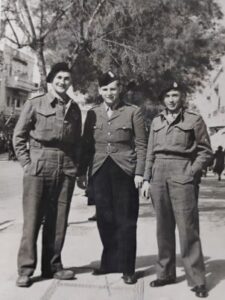
James in Tel Aviv with 2 Anzac officers, Lts. Jim Moodie and Joe Shucksmith
By 1st February James was writing from a Training Depot in the Middle East and later that month he was on a training course in Palestine where he managed to fit in a couple of games of rugby. For the next two months he was slowly moving up to join the 7th Battalion. On April 3rd he was promoted to Lieutenant and two days later, on April 5th, he finally joined the 7th Battalion. At this time the Battalion was heavily engaged in a major battle to break through the Mereth Line in Southern Tunisia and James remained at Battalion HQ until this action was successfully completed. The Battalion suffered heavy casualties in this action and were deployed to a rest area to reorganise and this is where James joined his Company and took over his first command in charge of a Platoon.
The 7th Battalion’s next major action was the invasion of Sicily on June 10 and in a letter home James, who was in the first assault wave, suggested his Platoon could have been the first to land on Sicily as they were ashore “a little ahead of zero”. The 7th Battalion were then very much part of the 51st Highland Division’s rapid advance through Sicily until a major reverse in an advance in the Sferro Hills south of Catania on the night 31st July to 1st August. James’ company had reached its objective and while it was reorganising he took out a patrol to mop up enemy posts. Unfortunately the Company had bypassed an area held by a crack SS Division who attacked from the rear and when James returned from his patrol he found the Company had been overrun and all the other officers either wounded or taken prisoner. James then took command of the Company, successfully re-uniting the three Platoons. Having lost radio contact with Battalion HQ he formed a fighting patrol who fought their way through enemy lines to reach the Battalion’s other company where he was able to report the situation to Battalion HQ. The following day, with artillery support, the Battalion forced the Germans to withdraw and cleared the way to the Catania Plain.
For this action James was awarded the Military Cross and his citation read “Lieutenant Rennie, during the most critical stage of this battle, displayed outstanding coolness and courage under most difficult and confused conditions and acted with the highest degree of initiative and determination”. James was particularly pleased that, on his recommendation, his platoon sergeant was awarded the Military Medal for his part in the action.
Some six weeks after this action James was sent on three months’ detachment as an instructor at an Officers’ Training School – the Allied School of Infantry – at Constantine, in Algeria. This detachment was cut short, however, as James was recalled with the Battalion to return to England and prepare for the invasion of France.
The 7th Battalion were then based in the South of England undergoing intensive training for the invasion. This did mean that in February 1944 he got his last home leave – the first since December 1942 - before he went to the Middle East. The 7th Battalion were not involved in the D-Day landings and did not land in Normandy until 10th June and it was June 18th before they moved into the front line to join in the battle for Caen. On June 23rd the second-in-command of James’ Company was taken ill and James was promoted to the acting rank of Captain and appointed second-in-command in his place. His duties as second-in-command included escorting any casualties back to Battalion HQ at the end of the day and reporting the Company’s situation to the Commanding Officer. On the 24th of June James had completed those duties shortly after midnight and had just left the Command Post when a heavy shell landed close to him and he was killed outright.
In a lengthy letter to James’ parents his Company Commander, Major David Russell, said “Jim had an extraordinarily fine record in this Battalion; he was always very well liked by everyone, both officers and men, he was a born leader and distinguished himself many times in battle and he was a good friend to all; as sports officer he was a tremendous
success and really had people 100% enthusiastic and working with him; I can truthfully say he was one of the best and most popular officers in the Battalion. His going was a tremendous blow to everyone and more so to me as he was by far the best officer in my Company and one who I could trust absolutely with any job”.
Another letter received by his parents came from Private C. List, nicknamed “Judd”, who had been James’ batman since he joined the 7th Battalion in April 1943. He gathered together James’ personal effects to send home and even travelled to Leuchars to visit James’ parents. He told James’ parents, “I was his batman, he always called me Judd. You will know by the time this reaches you that God took him away from you 2 days ago. I was with him to the end and he died a hero doing 10 men’s work that night. He was the best officer I ever knew and I couldn’t stop the tears falling all that night. He was made Captain the day before and 2nd in command of the Company a thing he always wanted to be. I was the first one he told.”
James was buried at Ranville War Cemetery in Calvados, some 10 kilometres from Caen.
FALLEN HEROES
JAMES CAMPBELL RENNIE
Army • CAPTAIN
Black Watch (Royal Highland Regiment)
7th BattalionDIED | 25 June 1944
AGE | 21
SERVICE NO. | 247041
FALLEN HEROES
JAMES CAMPBELL RENNIE
Army • CAPTAIN
Black Watch (Royal Highland Regiment)
7th BattalionDIED | 25 June 1944
AGE | 21
SERVICE NO. | 247041




